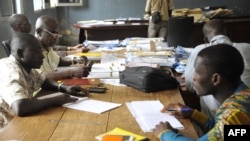By car and by plane, results from polling stations across Guinea are making their way to this capital city for tallying after Sunday’s election, the second democratic vote in the West African country’s history.
President Alpha Conde is running for a second term against seven challengers, including three former prime ministers. Conde, who took office in December 2010, had been elected the previous month. That marked the first democratic balloting since Guinea was freed of French rule in 1958.
Guinea’s National Independent Electoral Commission estimated voter turnout for the current election at about 75 percent.
But so far, the vote tallies have been slow to reach Conakry. As of Wednesday, the commission had received results from two neighborhoods in the capital and from one of the country’s 33 prefectures, spokesman Salifou Kebe said.
The commission also had received results from 11 polling stations in Guinea’s embassies abroad. Results from some of Guinea’s more remote regions were expected to arrive by air. Guinea does not allow results to be transmitted electronically.
Kebe said if there were no delays or problems at collation centers, Guineans could expect the commission to finish counting the votes on Friday.
Election deemed fair but disorganized
Observers from the European Union on Tuesday said the elections were free and fair, but also messy. They said disorganized voter lists and a lack of envelopes for ballots led to delays at polling stations. Some polling stations had to extend their voting hours to accommodate long lines of voters, a move that was criticized by the opposition.
Kebe defended the decision to prolong voting, saying Article 11 of the constitution ensures the absolute right to vote. Officials wanted to make sure everyone whose name was on the voter list was able to cast a ballot.
Guinea's main opposition party, the Union of Democratic Forces of Guinea, announced Wednesday evening that it had withdrawn from the electoral process. The party earlier had alleged massive fraud in the vote and called for it to be annulled.




